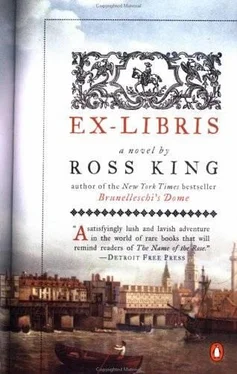The Hansa merchantman was barely visible through the spindrift. She was still listing badly and scudding recklessly under bare poles, but, for all that, she was intact and afloat. The crewmen could be seen on her upper decks, hoisting what little canvas was left on to the splintered masts. But the bursts of musket-fire, Quilter realised, were coming from much closer to shore.
A fourth shot crackled along the strip of beach. The looters cursed among themselves and retreated deeper into the safety of the osiers. Quilter could see them fumbling at their belts for their daggers and old-fashioned matchlock pistols whose tapers were impossible to light because of the drizzle.
He shifted his gaze to the left, to where a cutter with its sail flapping and swelling had emerged an instant earlier from the smoke and wreckage. After a second he made out a figure in the prow, a man bent on one knee as if paying homage to a superior. Except the man wasn't paying homage to anyone, Quilter immediately realised, he was taking aim with his musket at the few figures left among the pyramids of crates. At a fifth crack one of the figures shrieked like a kite, arched its back, then dropped in the sand. The cutter splashed forward, its prow nodding in the waves.
Yes, it was Sir Ambrose Plessington after all, Quilter had decided. Trust a rascal like him to survive when good men like poor old Pinchbeck had perished. Two other figures-Sir Ambrose's companions, he supposed-were hunched in the stern, barely visible behind the swollen sail. So they, too, had survived the shipwreck. Now they had come to claim what was left of their precious cargo, the unholy relics that some would say had been responsible for the whole dreadful misadventure.
He rolled out from behind the barrel and struggled to his feet. The boat was in the shallows now, its sail furled, one of the figures in the thwarts working a pair of oars. Quilter limped into the foaming water, waving his arms like a man in a London street frantically summoning a hackney-carriage.
'Sir Ambrose!' He took another step forward into the waves. The boat had run aground and the figure from the prow was clambering over the gunwale. 'Sir-'
Even before the musket-ball whizzed past his shoulder and sent him plunging again for the safety of the barrel he had realised that the man in the prow was not Sir Ambrose, nor the cutter that of the Bellerophon .
***
From a quarter-mile up the beach Emilia was also watching as the three men came ashore. She had landed on the beach almost an hour earlier. As it happened, the Captain was right. She and Vilém had indeed escaped the wreck of the Bellerophon along with Sir Ambrose. They had cut one of the longboats free from its canvas sling and clambered inside barely ten minutes before the hull collapsed. The journey from ship to shore, a distance of no more than a mile, surpassed even the one from Breslau to Hamburg for danger and discomfort. The gunwales of the longboat had been splintered and its paddles had gone missing. After an hour it had shipped so much water through a leak in the hull that Vilém and Sir Ambrose were reduced to bailing water with their hats, Emilia with panels of her skirts. But somehow the vessel remained afloat. For the next ten hours the three of them had drifted back and forth on the current, the bonfires looming as they neared the shore, then fading as they slipped away. Then at last the wind died and the sail, a tattered piece of canvas, was raised. Fifteen minutes later they scraped the boat across the shingle and into the sand.
Now Vilém and Sir Ambrose were dragging the crates ashore, sliding them across the bladder-wracked shingle, through winkle shells that crackled underfoot. Five crates of books had been pulled aboard. Sir Ambrose had explained that the other crates would have to be raised from the bottom. Fortunately there was a team of salvors in Erith, men who used special diving-bells and even a 'submarine', an ingenious invention by the Dutch magus Cornelius Drebbel, whom Sir Ambrose had met in Prague. Their services were employed by merchants and investors in the Royal Exchange to recover the cargoes of the thirty-odd ships that each year were wrecked on the Goodwin Sands or the other shoals in the mouth of the Thames. The submarine, a marvellous piece of engineering, a vessel made from balsa-wood and Greenland sealskin, featuring fins and inflatable bladders, would do the trick nicely.
'You must go ahead to London,' Sir Ambrose was saying as he struggled with another crate. 'Immediately. Monboddo will be expecting you. As will Buckingham. I shall send word to the Navy Office as soon as possible.'
Vilém gripped the other end of the crate and hoisted it from the mud, then together they carried it to the high water line and set it in the sand. The lid had come off, exposing and even spilling a few of its contents. As the two men staggered to the longboat to recover another crate, Emilia replaced the books, the last of which, tented open, badly water-damaged, was a thick volume that she recognised from the Spanish Rooms, one from which Vilém had read to her only a few months earlier, the Anthologia Graeca , a collection of epigrams compiled in Constantinople by a scholar named Cephalas. The original parchment had been discovered among the manuscripts in the Bibliotheca Palatina in Heidelberg, though this translation had been printed in London.
She turned the volume over, but before closing the sodden cover that smelled like wet shoe-leather she glimpsed a verse in the middle of the opened page, in the muted light of the bonfires:
Where is thine admired beauty, Dorian Corinth, where thy crown of towers? Where thy treasures of old, where the temples of the immortals, where the halls and where the wives of the Sisyphids, and the tens of thousands of thy people that were? For not even a trace, O most distressful one, is left of thee, and war has swept up together and clean devoured all…
Vilém had read the verse to her on a gloomy evening in September when word reached Prague that General Spínola's army had invaded the Palatinate and soon would lay siege to Heidelberg and-in a cycle of violence reeling backwards and forwards across hemispheres and centuries from the ruins of Corinth and Constantinople-what remained of the Bibliotheca Palatina, including the manuscript of the Anthologia Graeca .
A ragged shout reached her from the other end of the beach. The looters were on their way, stumbling in haste, heels tossing clods of mud and sand. Without knowing why, she slipped the volume into her pocket, then struggled to replace the wooden lid.
'… in the Strand,' Sir Ambrose was saying. He and Vilém had arrived with another crate. 'York House. Beside the river. I've had dealings with him before.'
'Yes?'
'He's one of the best. Paintings, marbles, books. Perfectly respectable, of course. Also kept a good many baubles out of the Earl of Arundel's grasping hands, I can tell you that.'
Vilém was breathing hard. 'He knows the plan?'
'Of course he knows it. He's known it from the outset. Not to worry.' The seaweed-draped crate thudded into the sand. 'He's perfectly capable.'
'And trustworthy?'
'Trustworthy?' Sir Ambrose chuckled, then cocked an eyebrow at him. 'Oh, Monboddo is a true coin, we have no worries on that account. You'll be safe enough, the pair of you. Provided you make it to London,' he added, nodding at the looters slipping and stumbling towards them. Not far behind were the three men who had disembarked from the boat. 'I seem to have lost my pistol, worse luck,' he said in a casual tone. He had begun walking, unhurried, towards the longboat. 'Not to mention my sword. It would appear, my friends, that we find ourselves in yet another spot of trouble.'
***
No coach moved as swiftly over the roads of England in those days as the ones belonging to the De Quester Post Office for Foreign Parts. Each vehicle in the De Quester fleet had been specially designed to cover the seventy-mile journey from London to Margate, or from Margate to London, in less than five hours, even with a few passengers on board and a heavy load of ten mail-bags strapped to the leather roof or bundled inside. Their perches and sway-bars were made from poles of the lightest pine, while the axle-trees were greased with plumbago and the wheels mounted on springs and rimmed with iron. The whole contraption was pulled along the road by teams of Barbary horses bred for the task at a stable in Cambridgeshire. And so as dawn broke over the Chislet Marshes, one of these swift vehicles must have made an unusual sight as it lumbered and jolted through the mire at an even slower pace than the crate-laden donkey-carts creeping along in the opposite direction.
Читать дальше












